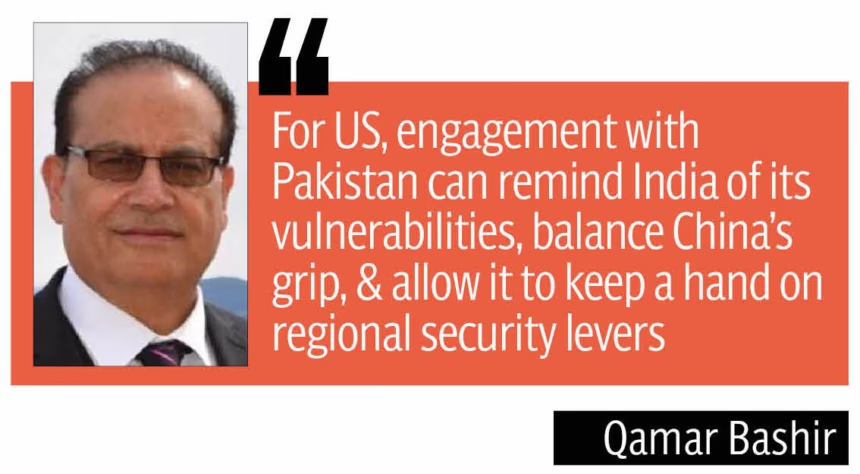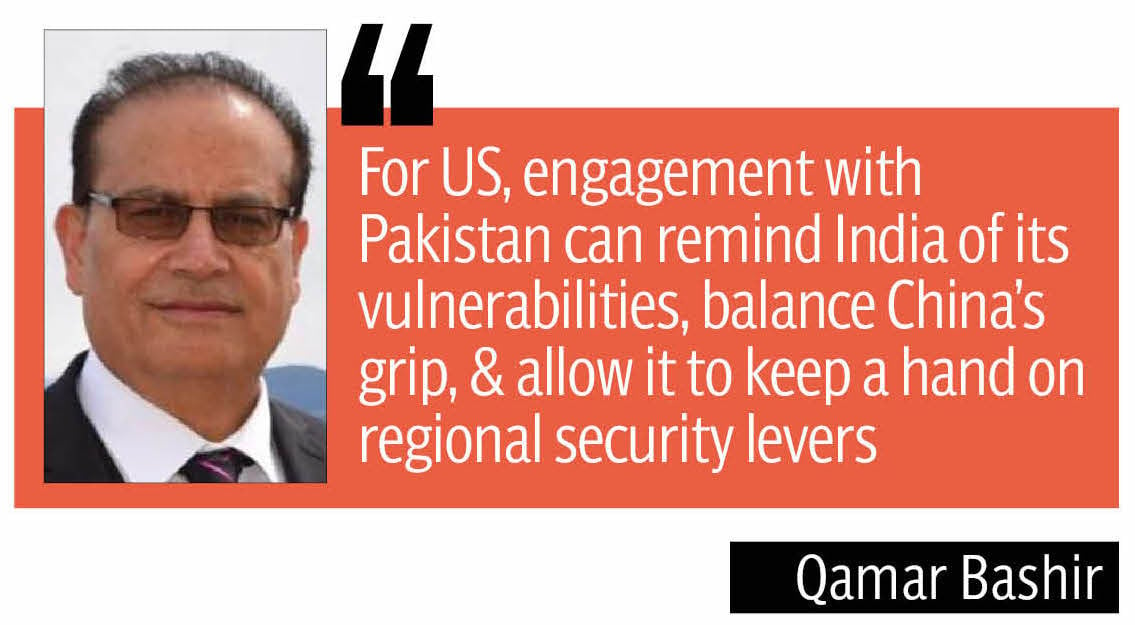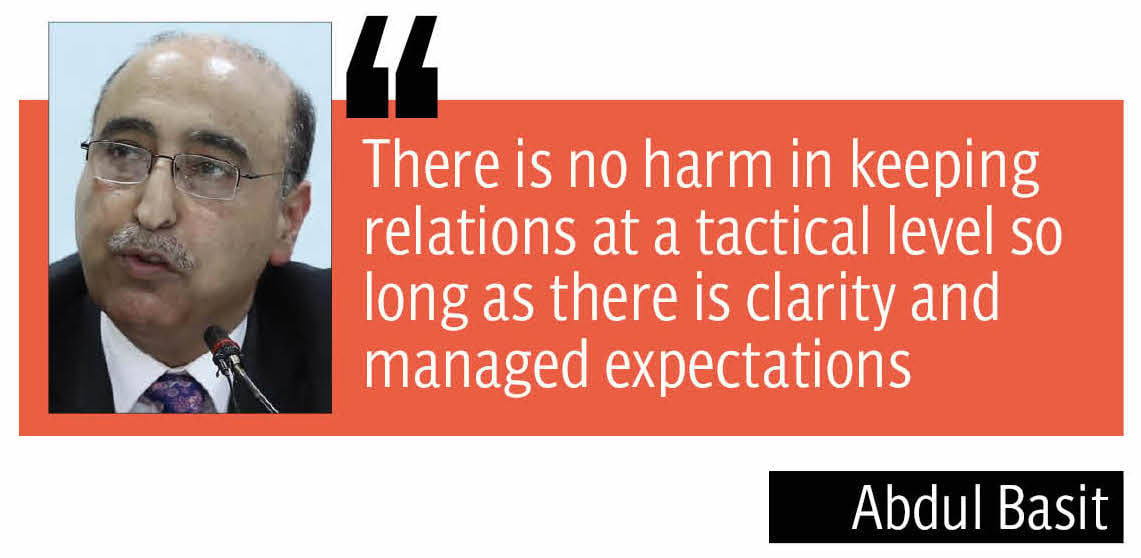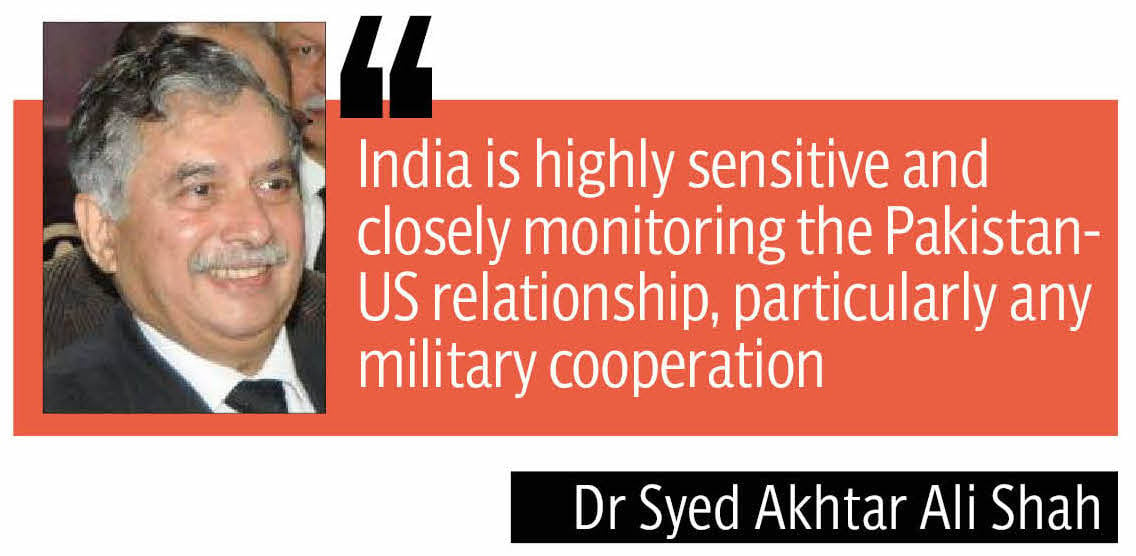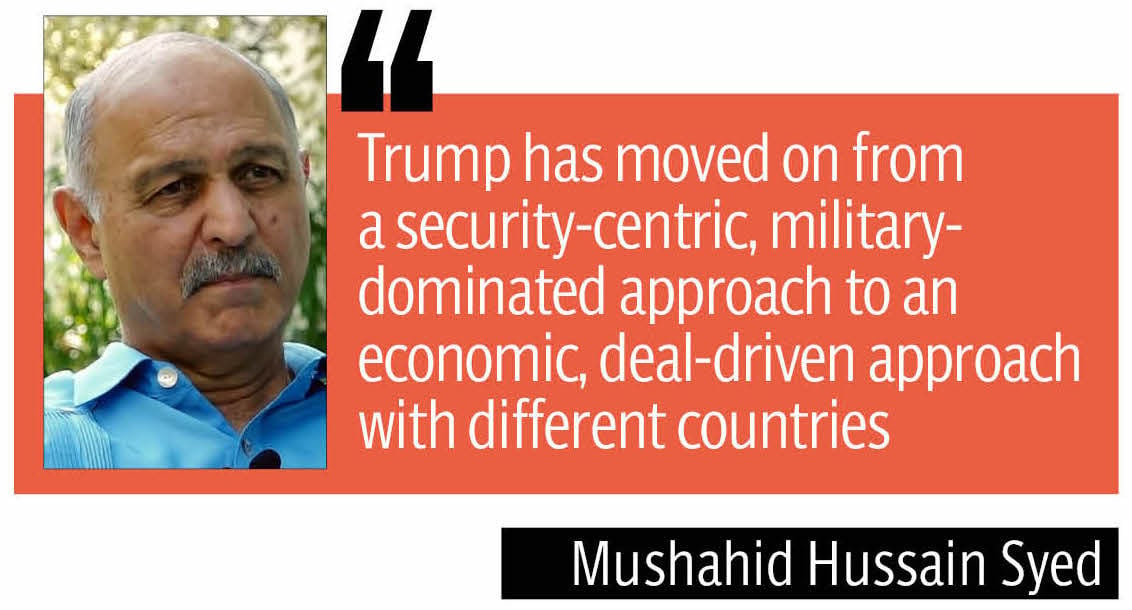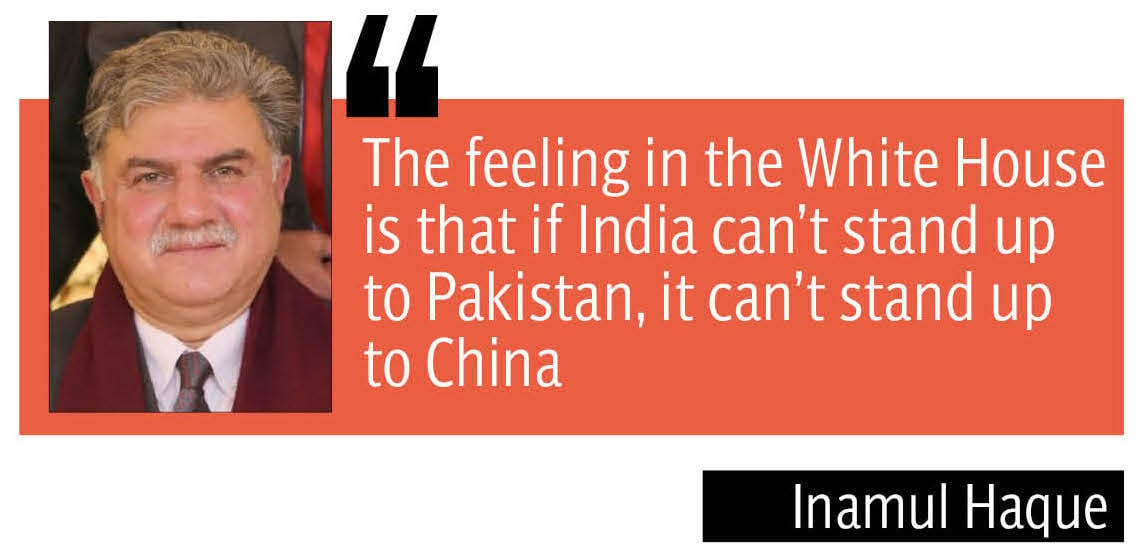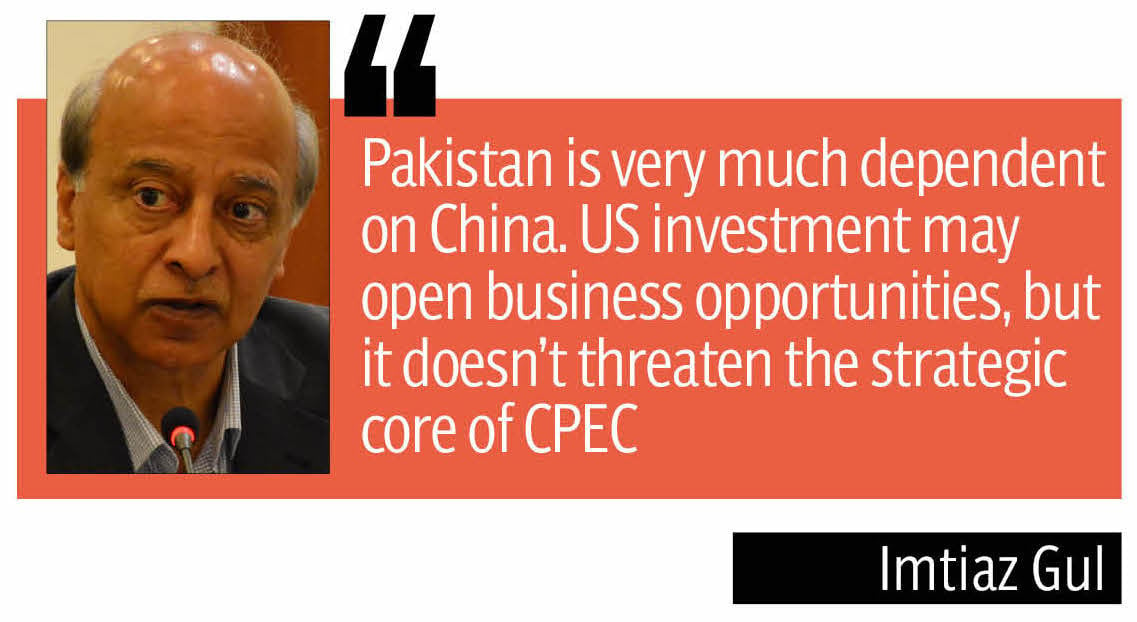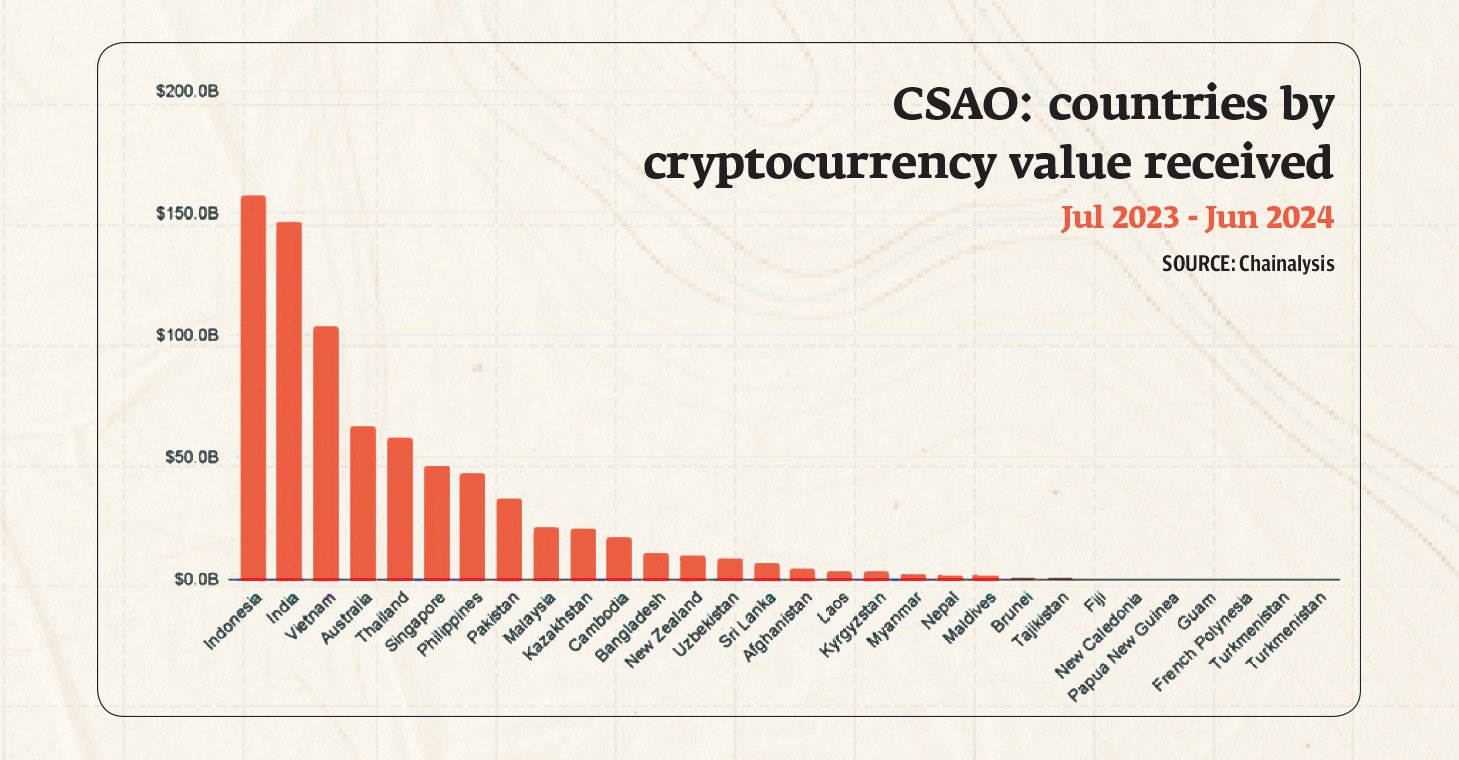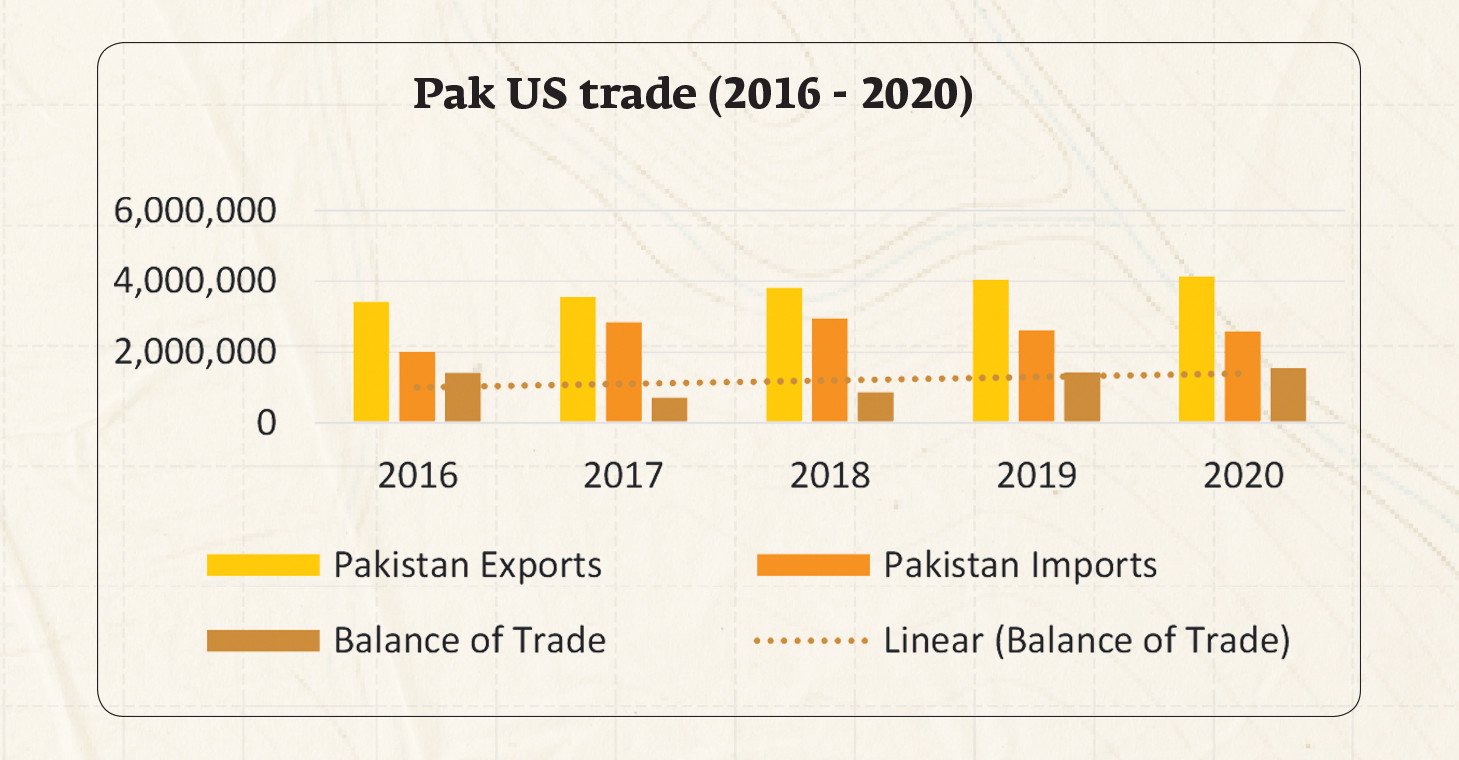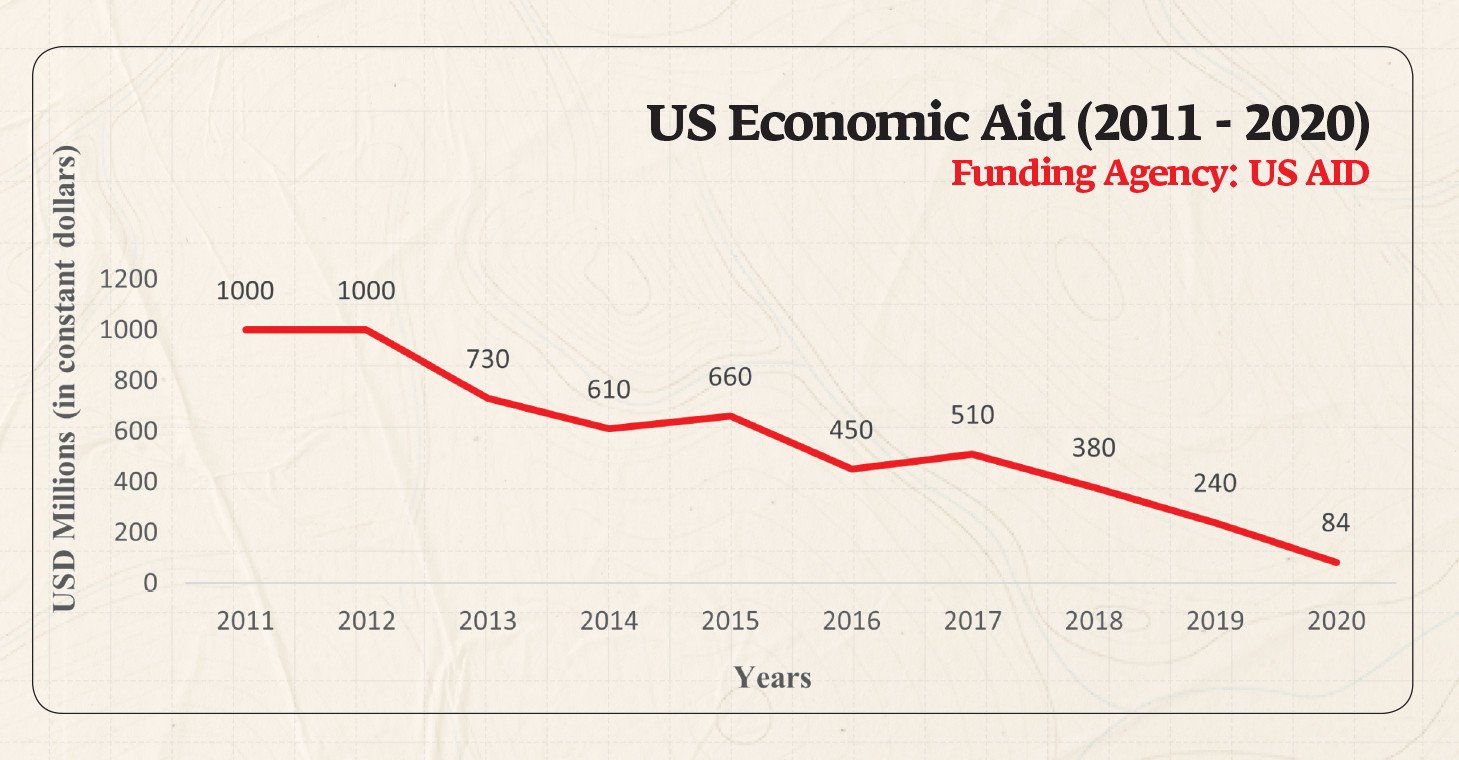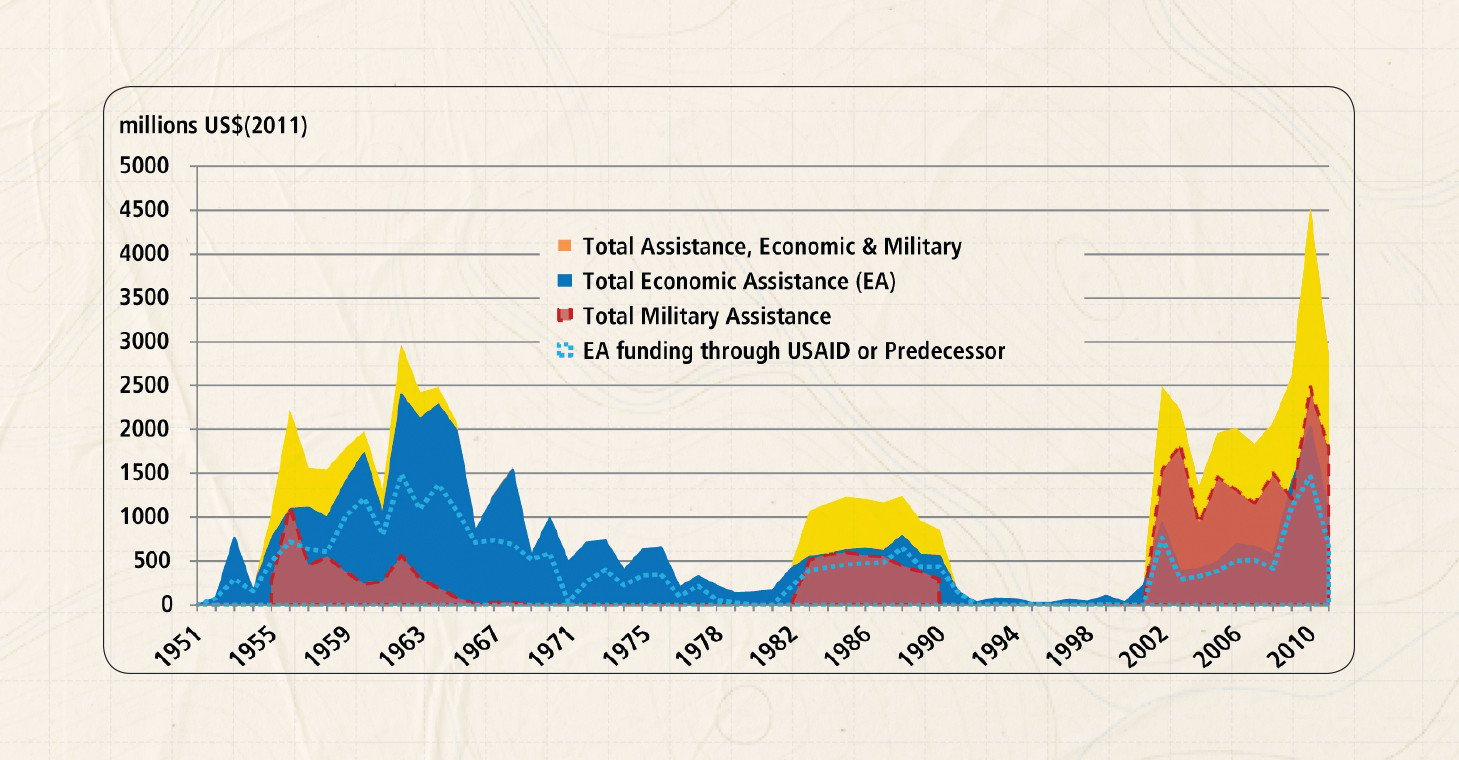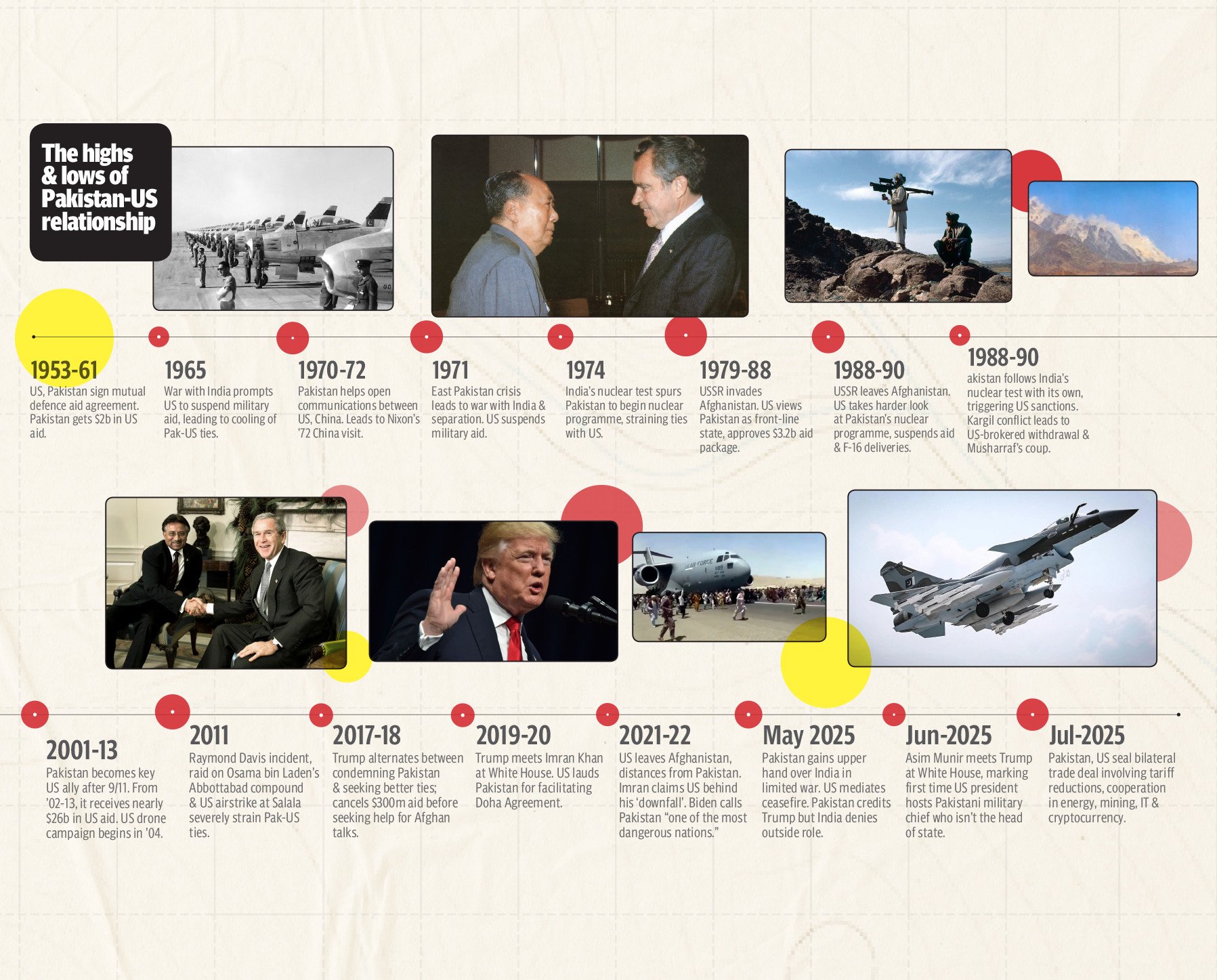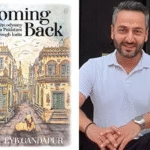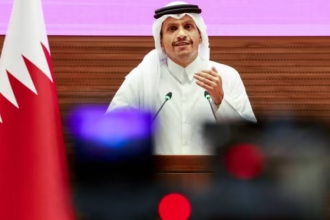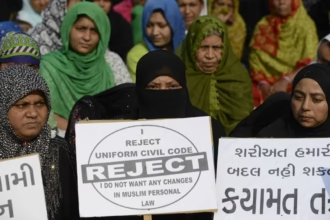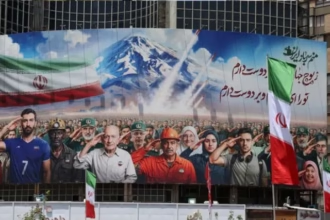Naveed Hussain/Zeeshan Ahmad
|
PUBLISHED
September 06, 2025
KARACHI:
The sudden recalibration of Pakistan-US relations this year is a harbinger of a seismic shift in South Asian geopolitics. Partially triggered by the May 2025 India-Pakistan conflict, Washington and Islamabad are once again engaged in a cautious tryst that feels all too familiar to anyone who has watched the two embrace and recoil over the past seven decades.
Relations between Pakistan and the United States hit rock bottom in 2011 after the US raid in Abbottabad that killed al Qaeda chief Osama bin Laden. They improved somewhat in 2020, when the US acknowledged Pakistan’s role in facilitating the Doha Agreement with the Afghan Taliban. However, with the arrival of President Joe Biden in 2021, ties went into a diplomatic freeze once again. They were relegated to the sidelines for much of his term as the Biden administration leaned on India to stall China’s growing influence in the region.
Pakistan had tempered expectations from President Donald Trump, given the confrontational tenor of his first term in office. Islamabad had ample reason for pessimism as Richard Grenell, a special envoy in the second Trump administration, appeared to echo the narrative of the embattled opposition party, PTI, on ‘X’. Amid this unease, Interior Minister Mohsin Naqvi made a hurried trip to Washington for President Trump’s formal inauguration, even though he wasn’t officially invited.
And then came a godsend in March 2025 — weeks after Trump’s second inauguration. Pakistan arrested and extradited to the US an Islamic State-Khorasan (IS-K) operative, Mohammad Sharifullah, who was accused of helping plan the 2021 suicide bombing outside Kabul airport that killed 13 American soldiers.
Sharifullah’s arrest gave Trump something valuable to flaunt at the start of his second term — and Pakistan won rare public praise from him. “I want to thank especially the government of Pakistan for helping arrest this monster,” Trump said in his first address of second term to Congress.
Lisa Curtis, a senior official in Trump’s first administration, described Sharifullah’s arrest as an important step, which “could be sort of a building block, to reset the US-Pakistan relationship.”
The development marked a critical diplomatic win for Pakistan, showcasing its strategic relevance and counterterrorism capabilities at a pivotal moment. However, the real turning point came in the spring of 2025. The limited war between India and Pakistan in May created an unexpected opening for the US to re-enter the conversation in South Asia.
But this time the contours of engagement feel different.
“What’s happening in US-Pakistan relations is a surprise,” American analyst Michael Kugelman told the Financial Times recently. “I would describe the relationship now as one that’s enjoying an unexpected resurgence, even a renaissance. Pakistan has very successfully understood how to engage with such an unconventional president,” he was quoted as saying.
A ‘tactical’ détente
As of now, the relationship is neither the deep partnership of the early “war on terror” years nor the estrangement of the mid-2010s. According to various experts it’s transactional, tactical and highly contingent.
“The current warming between Washington and Islamabad is best described as a functional détente — warm optics backed by pragmatic calculations,” said Qamar Bashir, former press minister at Pakistan’s embassy in France. “For now, it is primarily tactical — but with the potential to evolve into a strategic alignment if mutual interests continue to converge.”
Abdul Basit, Pakistan’s former high commissioner to India, is similarly cautious about how durable this rapprochement might be. However, he argues that there is “no harm” in keeping relations at a tactical level so long as there is clarity and managed expectations. “Better results can be achieved to mutual satisfaction,” he said.
Pakistan — too important to ignore
Curtis also offered a glimpse into the strategic thinking of President Trump during his second term. “With no US troops in Afghanistan, the primary concern for Trump will now be strategic competition with China. It’s not in the US interests for Pakistan to be completely dependent on China. We want Pakistan to have options, alternatives,” she said.
According to Bashir, Washington remains concerned about China’s entrenched role in Pakistan. “Closer US engagement is a way to balance Chinese influence over CPEC, secure a stake in infrastructure and energy projects, and diversify Pakistan’s external partnerships.”
He added that Pakistan’s military performance in the May war against India, aided by its deep defence relationship with China, has underlined its strategic weight in the region. “For Washington, engagement with Pakistan can serve multiple purposes — reminding India of its vulnerabilities, balancing China’s grip, and keeping a hand on regional security levers.”
Security and geopolitics analyst Maj Gen (retd) Inamul Haque echoed that assessment: “The feeling in the White House is that if India can’t stand up to Pakistan, it can’t stand up to China.” Within this broader context, rebalancing the relationship with Pakistan comes as a ‘sweetener’, Gen Inam noted. “So that it does not go completely in the Chinese camp.”
Irritation with India
Across the border, the Narendra Modi government’s awkward handling of Trump’s bid to claim credit for ending the May conflict also seems to have irritated the White House. While Islamabad has praised Trump for brokering the ceasefire and offering mediation on other chronic issues like Kashmir, Delhi insisted on bilateralism. As that irritation translates into calculated warmth toward Islamabad, it is a reminder that the US-India rendezvous is not immune to ego and friction.
“For India, any shift in Washington’s tone or favour toward Islamabad raises concern,” said Bashir. “The US appears to be leveraging Pakistan both to remind India of its strategic vulnerabilities and to coax it back into closer alignment with US policy.”
The newfound warmth between Washington and Islamabad comes at a time when US-India strategic convergence — particularly around the Quad and Indo-Pacific security — was assumed to be a settled fact. Trump’s overtures to Pakistan have disrupted this narrative, raising concerns in Delhi that Washington’s commitments are more transactional than strategic.
“India is highly sensitive and closely monitoring the Pakistan-US relationship, particularly any military cooperation,” said Dr Syed Akhtar Ali Shah, former K-P police chief who writes on security and geopolitical issues. “If Washington leans too far toward Islamabad, India could interpret it as undercutting the Quad’s strategic coherence.”
“Right now, the debate within the Indian policy establishment is over whether — and how — India can be brought into a partnership alliance with the United States,” explained Gen Inam. “Efforts are being made to make that happen, but India remains hesitant. In recent years, Trump sought to offer certain concessions to India, but Delhi was not ready to reciprocate.”
Bashir, meanwhile, said, “India’s pivot toward Russia — buying discounted oil and advanced weaponry despite US disapproval — has strained parts of the US-India ties.” He said closer US-Pakistan engagement could serve as a subtle pressure point on Delhi, reminding it that Washington retains strategic options in South Asia.
This assessment seems more conceivable, certainly more after the Trump administration slapped 50% tariffs on Indian exports to the United States — the highest after Brazil — accusing New Delhi of indirectly funding Russia’s war in Ukraine by purchasing crude oil from Moscow.
Reading Trump right
For Mushahid Hussain Syed, former chair of the Senate foreign relations committee, Pakistan has been able to read Trump “right”, both in terms of his persona and his policies. “Trump is impressed by three things: he loves winners and the Pakistanis have come across as confident winners in the military encounter with India last May, while India is behaving like a loser, cribbing about Pakistan at every forum,” he said. “Secondly, Trump is impressed by straight shooting, smart talking generals over deceptive double dealers or politicians who say one thing and do another,” he added.
Mushahid’s assessment hits the mark. Army chief Field Marshal Asim Munir’s visit to Washington, particularly his unprecedented, protocol-defying luncheon with President Donald Trump at the White House, marked a pivotal moment in the ongoing reconfiguration of Pakistan-US relations. “A central character in the renewed relationship [with the US] has been Pakistan’s army chief,” read an article by The Washington Post on the détente.
Mushahid observed Pakistanis are also culturally predisposed to be more affable, adaptable and relaxed when interacting with Americans — which Trump seems to respond to — as opposed to Indian politicians who come across as sullen faced, angry, upset and unwilling to appreciate the good things the US president has achieved. “Like the ceasefire, which both India and Pakistan wanted: Islamabad publicly appreciated his efforts while Delhi, true to its form, was trying to be deceptive.”
He also noted that Pakistan, unlike India, has understood the shift: “Trump has moved on from a security-centric, military-dominated approach to an economic, deal-driven approach with different countries,” he said. “Above all — and this is very significant, which Indians don’t seem to realise — he has de-prioritised strategic bilateral relationships that were once cornerstones of US policy.”
“That’s why India was pampered and mollycoddled in the past by Democrats like Obama and Biden. Trump has no time for that. He said: you give something to get something — no more free lunches. So, India has had a rude shock,” he added.
Factoring in Afghanistan
However, Pakistan’s rising goodwill in Washington is down to more than just flattery of Trump. Gen Inam pointed out that for many US interests in the region and beyond, Pakistan’s role remains more relevant than India’s. He referred to three main aspects of India-US ties in this context: attempts to form a strategic alliance, difficulties in reciprocity and the recognition that Pakistan still holds certain relevance which India can’t replace.
“Afghanistan’s instability is going to aggravate this dynamic further. That is something Washington also understands,” he said. “Another is Pakistan’s ongoing counterterrorism cooperation with the US and the West plus.”
According to Gen Inam, there is a greater realisation in the American camp that without Pakistan’s interlocution, Afghanistan’s instability will gravitate towards bad outcomes.
Rare earth to crypto
Each US-Pakistan reset comes with its own driving philosophy. In the 1970s, it was Soviet invasion of Afghanistan. In 2001, it was the war on terror; in 2018, it was countering militancy and negotiating with the Taliban. In 2025, the story is being partially written around the May India-Pakistan crisis that jolted Washington into rediscovering Pakistan’s utility. But the real motives behind this reset go deeper than crisis management.
Publicly, President Trump said the reason for his unprecedented invitation to Pakistan’s army chief was to thank him for helping defuse the May crisis. Behind the scenes, however, the Trump administration uncovered something far more valuable – a range of strategic advantages, including a zero-tariff trade, access to rare earths, and cooperation on cryptocurrency ventures. These developments were a windfall for Trump’s foreign policy team, which had also pressured Ukraine into a rare earths deal.
Over the past five years, the geopolitics of critical minerals has been reshaped by the rapid expansion of electric vehicle production and defence technologies that rely on advanced battery systems. Global demand for these minerals is expected to quadruple by 2040, with the US military emerging as a major consumer. But for now, China dominates the entire supply chain, a dependency US policymakers view as a serious strategic vulnerability.
The mineral-rich province of Balochistan — home to the massive Reko Diq copper and gold deposits — along with the former tribal areas bordering Afghanistan, reportedly hold vast untapped reserves of critical minerals and rare earths. With the world’s fifth-largest copper reserves, Pakistan is increasingly seen in Washington as a potential alternative to China’s mineral dominance.
By promoting US investment in Pakistan’s mining sector, the Trump administration hopes to recalibrate ties with Islamabad while simultaneously securing a foothold in the future global supply chain for strategic resources. A statement from the US State Department said that in his meeting with Deputy Prime Minister Ishaq Dar, Secretary of State Marco Rubio “underscored the importance of expanding mutually beneficial bilateral trade and exploring prospects for enhancing collaboration in the critical minerals and mining sectors.”
“Pakistan holds deposits that have thus far been largely tapped by China through CPEC,” said Bashir. “The US wants a share in these resources to reduce Chinese dominance in the supply chain,” he said, adding “Pakistan’s mineral reserves, if tapped through US partnership, could serve both sides: diversifying US supply chains and bringing investment into Pakistan’s extractive and processing sectors.”
Mushahid sees Trump as “enamoured” by the prospect of a “sweetheart deal”: “Pakistan is offering him [Trump] what I call the ‘three Cs’ — counterterrorism cooperation in a more strategic part of the world; crypto, which is his new love; and the third ‘C’ is of course critical minerals, which is the new oil in the 21st century. Pakistan has all three… so he’d love to do business with the Pakistanis.”
“Trump needs success stories to proclaim and Pakistan is happy to give them to him,” the Financial Times quoted Hussain Haqqani as saying.
Islamabad’s strategic calculus
For Islamabad, US re-engagement offers the kind of great-power attention it had been missing as India leaned into its own global ambitions. After years of strained ties, the simple fact of high-level American attention is itself considered a win in Islamabad. There are hopes US investments might follow, relieving economic pressures.
But Pakistan’s offer is also shaped by strategic considerations. Security planners in Islamabad believe that American investment in critical minerals could help stabilise the former tribal areas and Balochistan, which have been wracked by Taliban and Baloch insurgencies.
Pakistani officials say they have incriminating evidence of the involvement of multiple foreign actors, directly or indirectly, in fomenting unrest in Balochistan. In particular, it is increasingly alarmed by reports suggesting Israeli intelligence involvement in steering the Baloch insurgency, they added.
Last month, the US and Pakistan held the latest round of counterterrorism talks in Islamabad. In a joint statement issued afterward, Washington designated separatist militant group Balochistan Liberation Army and its suicide squad Majeed Brigade as “foreign terrorist organisations.”
“The US-Pakistan counterterrorism dialogue joint statement is one of the most positive and effusive I’ve seen from these two countries on CT for quite a few years,” Kugelman was quoted as saying on the development.
Last bridge to Iran
Media reports have suggested that the US may also be using Pakistan as a backchannel to re-engage Iran on nuclear negotiations. This comes after formal diplomatic talks between Washington and Tehran collapsed following US strikes on Iranian nuclear facilities.
“Pakistan is uniquely placed to facilitate US-Iran dialogue. With Washington cautiously re-engaging Tehran on the nuclear file, Islamabad’s geographic position and diplomatic channels make it a natural intermediary,” Bashir observed. Dr Shah shared that view, noting that Pakistan may be used as a go-between for the US and Iran in the future.
Cautious optimism
Economically, the reset offers opportunity but little certainty. Bashir said that Washington’s willingness to work through Pakistan’s existing power structures could accelerate decisions on IMF support, debt relief, and targeted development funding.
Talk of renewed US investment and aid is already in the air, but history urges caution. Washington’s generosity has almost always been tethered to strategic utility rather than Pakistan’s development needs. By making itself “useful” once more, Pakistan risks falling back into the familiar cycle: celebrated in Washington during moments of crisis, only to be sidelined when the urgency passes.
Against this backdrop, Gen Inam argued that the Pakistan-US relationship is likely to remain transactional. “It will also be based on very narrow outcomes. The US policy establishment’s approach toward China has always been consistent and will continue into the future. From Washington’s perspective, their strategic focus remains unchanged.”
Mushahid, meanwhile, framed the recent bonhomie as a Trump-specific phenomenon, not an institutional shift. “This is all about Trump, not the American system,” he said. But for him, that is not necessarily a disadvantage. “As long as Trump is in office, that works to Pakistan’s advantage. He’s not a warmonger. He’s a dealmaker and a peacemaker.”
In his view, Islamabad has so far played its hand well. Beyond reasserting itself as a key regional player, Mushahid said that Washington is treating Pakistan and India on a more equal footing. “It is not looking the other way when the Modi regime enacts fascism and hate crimes against Muslims and Kashmiris. Trump has made it clear that Kashmir is the core issue between India and Pakistan. That is music to Pakistan’s ears, and a source of shock and chagrin for India.”
He added that Pakistan has positioned itself so that its relationships — the triangle linking Washington, Beijing, and Tehran — have created valuable strategic space, at least for the next three years while the Trump administration remains in office. This, he argued, gives Pakistan tremendous room to maneuver as the region’s geopolitical and geoeconomic pivot, “through its economy, energy corridors, ports, pipelines, roads, railways, and the ‘three Cs.’”
Impact on Pakistan-China ties
As Washington signals renewed interest in Pakistan, questions inevitably arise about the impact on Islamabad’s cornerstone strategic partnership with Beijing. Although the thaw with Washington does not displace this relationship, could it complicate its optics and balance?
Bashir underscored the structural depth of the China-Pakistan partnership, describing it as “strategic, mature, and above the shifting tides of Pakistan’s relations with any third country, including the US.”
He pointed out Beijing’s long-standing approach of engaging nations on the basis of mutual benefit, steering clear of internal political interference, and maintaining steady ties regardless of which government or military leadership is in power. CPEC, he stressed, is “not a tactical project but a core pillar of China’s global strategy and Pakistan’s development framework.”
“Its depth and integration mean it cannot be undermined or replaced simply because US-Pakistan relations experience an upswing,” Bashir argued, adding that for Washington to match China’s role, it would need to “raise its investment and strategic commitment many times over what it currently offers — something unlikely in the near term.”
Former envoy Basit concurred, highlighting the diplomatic space Pakistan can occupy between Washington and Beijing: “You never know Pakistan might be playing some role between the US and China. Should Trump get along well with President Xi [Jinping], there will be far more space for Pakistan to benefit from both relationships.”
Gen Inam further highlighted the constancy of the China-Pakistan relationship versus the variability of Pakistan-US ties: “I see one relationship as steady, while the other seems more fluctuating. With China, it is a relationship where we understand each other, stand together, and act together,” he said.
Imtiaz Gul, Executive Director of the Centre for Research and Security Studies, reinforced Pakistan’s dependence on China, especially in defence: “85% of Pakistan’s defense hardware now comes from China. So, Pakistan is very much dependent on China.” He underscored that while US investment may open business opportunities, it does not threaten the strategic core of CPEC. “There’s no competition between the Belt and Road Initiative and the build-back-better-world as Joe Biden had described it. So, I don’t see any perilous impact as far as the Belt and Road Initiative concerned,” he said.
A delicate balancing act
To sum up, the evolving Pakistan-US relationship signifies a pragmatic recalibration driven by shifting regional dynamics, strategic interests, and the influence of leadership personalities. While this renewed engagement offers Islamabad significant geopolitical leverage and economic opportunities, it remains largely transactional and dependent on broader US priorities, especially concerning China and India. For Islamabad, choreographing the diplomatic foxtrot between Washington, Beijing, and Delhi will require nuanced diplomacy and strategic foresight. As the region steers through a period of uncertainty, Pakistan’s ability to capitalise on its unique position could prove crucial — not only for its national interests but also for shaping the broader landscape of South Asian and global geopolitics.


